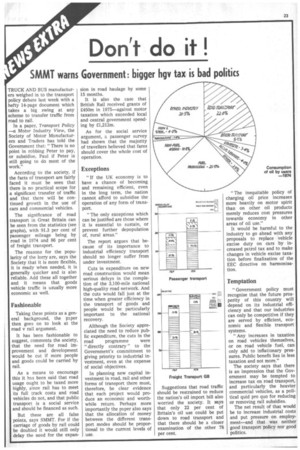Don't do it !
Page 25

If you've noticed an error in this article please click here to report it so we can fix it.
SMMT warns Government: bigger hgv taxi is bad politics
TRUCK AND BUS manufacturers weighed in to the transport policy debate last week with a hefty 14-page document which takes a big swing at any scheme to transfer traffic from road to rail.
In a paper, Transport Policy —a Motor Industry View, the Society of Motor Manufacturers and Traders has told the Government that: "There is no point in robbing Peter to pay, or subsidise, Paul if Peter is still going to do most of the work."
According to the society, if the facts of transport are fairly faced it must be seen that there is no practical scope for a significant transfer of traffic and that there will be continued growth in the use of cars and commercial vehicles.
The significance of road transport in Great Britain can be seen from the statistics (see graphs), with 91.3 per cent of passenger mileage being by road in 1974 and 86 per cent of freight transport.
The reasons for the popularity of the lorry are, says the Society that it is more flexible, it is ready when needed, it is generally quicker and is also reliable. Add these all together and it means that goods vehicle traffic is usually more economic as well.
Fashionable
Taking these points as a general background, the paper then goes on to look at the road v rail argument.
It has been fashionable to suggest, comments the society, that the need for road improvement and development would be cut if more people and goods could be carried by rail.
As a means to encourage this it has been said that road usage ought to be taxed more highly, since rail has to meet its full track costs and road vehicles do not, and that public transport is •a social service and should be financed as such.
But these are all false points, says SMMT. For if the carriage of goods by rail could be doubled it would still only delay the need for the expan sion in road haulage by some 15 months.
It is also the case that British Rail received grants of £450m in 1975—against motor taxation which exceeded local and central government spending by £1,212m.
As for the social service argument, a passenger survey had shown that the majority of travellers believed that fares should cover the whole cost of operation.
Exceptions
"If the UK economy is to have a chance of becoming and remaining efficient, even in the long term, the nation cannot afford to subsidise the operation of any form of transport.
"The only exceptions which can be justified are those where it is essential to sustain, or prevent further depopulation of, rural areas."
The report argues that because of its importance to industrial efficiency transport should no longer suffer from under investment.
Cuts in expenditure on new road construction would mean serious delays in the completion of the 3,100-mile national high-quality road network. And the cuts would fall just at the time when greater efficiency in the transport of goods and people would be particularly important to the national recovery.
Although the Society appreciated the need to reduce public expenditure, the cuts in the road programme were "directly contrary" to the Government's commitment to giving priority to industrial investment, even at the expense of social objectives.
In planning new capital investment in road, rail and other forms of transport there must, therefore, be clear evidence that each project would produce an economic and worthwhile return. Perhaps more importantly the paper also says that the allocation of money between the different transport modes should be proportional to the current levels of use. Suggestions that road traffic should be restrained to reduce the nation's oil import bill also worried the society. It says that only 22 per cent of Britain's oil use could be put down to road transport and that there should be a closer examination of the other 78 per cent, "The inequitable policy of charging oil price increases more heavily on motor spirit than on other oil products merely reduces cost pressures towards economy in other areas of oil use."
It would be harmful to the industry to go ahead with any proposals to replace vehicle excise duty on cars by increased petrol tax and to make changes in vehicle excise taxation before finalisation of the EEC directive on harmonisation.
Temptation
"Government policy must recognise that the future prosperity of this country will depend on its industrial efficiency and that our industries can only be competitive if they are served by efficient, economic and flexible transport systems.
"Any increases in taxation on road vehicles themselves, or on road vehicle fuel, can only add to inflationary pressures. Public benefit lies in less taxation and not more."
The society says that there is an impression that the Government may be tempted to increase tax on road transport, and particularly the heavier commercial vehicles, as a political quid pro quo for reducing or removing rail subsidies.
The net result of that would be to increase industrial costs and put pressure on employment—and that was neither good transport policy nor good politics.
















































































































